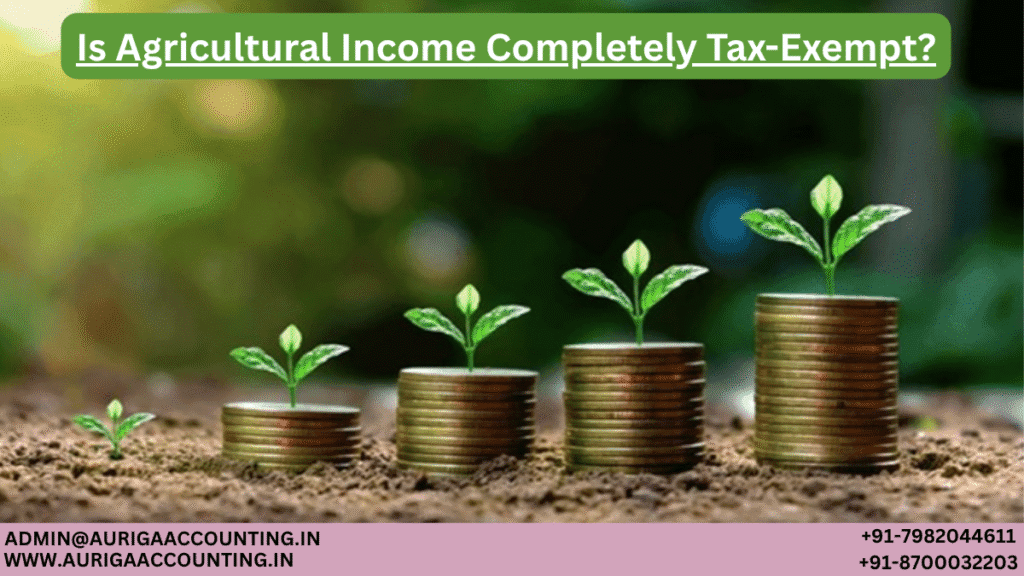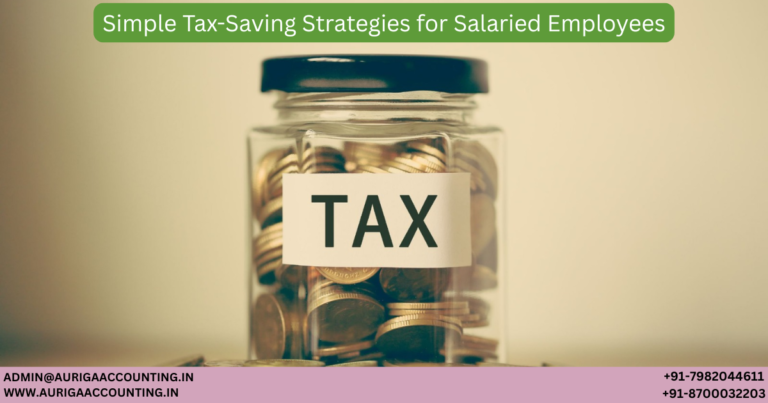Shivani is an accomplished writer known for her ability to simplify complex legal topics into clear, practical insights. Her content equips entrepreneurs with the essential knowledge to confidently navigate business laws, helping them launch and manage their ventures with greater ease and clarity.

Is Agricultural Income Completely Tax-Exempt?
Introduction
ToggleAgricultural income plays a vital role in the economies of agrarian nations like India and holds a distinctive status under the country’s tax laws. A common question that arises is: Is agricultural income fully exempt from income tax? The answer is not entirely straightforward. While agricultural income is generally exempt from direct taxation, this exemption applies only under specific conditions. In certain cases, it may be indirectly taxed when combined with non-agricultural income for rate purposes. This article provides a comprehensive overview of how agricultural income is treated under tax regulations, aiming to bring clarity for individuals and entities engaged in farming and related activities.
What Is Agricultural Income?
Agricultural income refers to the earnings generated from agricultural activities. In India, this includes a range of sources tied directly to farming and related operations. Here are some common examples:
Income from Crop Cultivation: Earnings from growing and harvesting food grains, fruits, vegetables, and other crops.
Income from Livestock and Poultry: Profits from breeding and selling animals such as cows, goats, and poultry, when part of a farming operation.
Income from Trees and Plants: Revenue from the sale of trees or plants grown on agricultural land.
Income from Natural Farm Products: Proceeds from the sale of items like milk, honey, and similar products, if generated through farming activities.
Agricultural income can be earned from land within or outside India. However, its tax treatment depends on whether the land is located domestically or abroad.
Is Agricultural Income Exempt from Income Tax?
Under the Income Tax Act, 1961, agricultural income is generally exempt from tax. According to Section 10(1), income derived from genuine agricultural activities conducted on land within India is fully tax-exempt. This exemption applies regardless of the amount earned.
However, there are important conditions and exceptions that determine whether the exemption applies.
Conditions for Agricultural Income to Qualify for Exemption
To be considered exempt, agricultural income must meet specific criteria:
Nature of Activity: The income must result directly from agricultural operations, such as crop production or animal rearing.
Source of Income: The land must be used exclusively for agricultural purposes. Income from ancillary or unrelated business activities does not qualify.
Additionally, only income from agricultural land situated in India qualifies for exemption. Income from agricultural land located abroad is taxable under Indian tax laws
Agricultural Income and Its Impact on Taxability of Non-Agricultural Income
Although agricultural income is exempt from income tax, it can still influence an individual’s overall tax liability in specific scenarios—particularly for those with high non-agricultural income. Here’s how:
1. Effect on High Earners
When a taxpayer earns both agricultural and non-agricultural income, the agricultural portion remains exempt. However, for individuals whose non-agricultural income exceeds ₹5,00,000 (the basic exemption limit), the agricultural income is considered when computing the applicable tax rate on their taxable income. This is commonly referred to as the partial integration method.
2. Tax Rate Determination
Even though agricultural income is not taxed directly, it can push the non-agricultural income into a higher tax bracket. The process involves:
Adding agricultural income to non-agricultural income to determine the applicable tax slab.
Calculating tax on the combined income.
Subtracting the tax that would apply if only the agricultural income and exemption limit were considered.
The net result is the tax payable on non-agricultural income at the higher effective rate.
3. Ensuring Fair Taxation
This mechanism prevents high-income individuals from avoiding higher taxes simply by earning a large portion of their income through agricultural activities. Although agricultural income itself remains exempt, its inclusion for rate calculation ensures that taxpayers pay their fair share on taxable (non-agricultural) income
Agricultural Income: Central vs. State Taxation
While agricultural income is exempt from income tax at the Central government level, certain state governments hold the authority to tax agricultural income under specific circumstances. For example, states such as West Bengal, Assam, and Bihar impose taxes on agricultural income in certain cases.
Key Exceptions and Clarifications on Agricultural Income
Taxpayers should be aware of important exceptions and clarifications regarding what qualifies as agricultural income:
Land Located in Urban Areas: Income earned from agricultural activities conducted on land situated in urban areas is not treated as agricultural income. Instead, it is taxable under the category of “Income from Other Sources.”
Processing of Agricultural Produce: If agricultural produce undergoes processing before sale (e.g., turning raw fruits into juice), the income generated is usually classified as business income and is therefore taxable, rather than exempt agricultural income.
Income from Tea, Coffee, and Rubber Plantations: Although income from these plantations is generally treated as agricultural income, it is subject to specific rules. Processing charges on such produce are considered non-agricultural, and only the non-agricultural portion of the income is taxable
Documentation and Compliance Requirements for Agricultural Income
Even though agricultural income is exempt from tax, maintaining proper documentation is essential to substantiate the claims. Important records to keep include:
Land Documents: Proof of ownership or lease agreements for the agricultural land.
Sale Receipts: Documentation of sales transactions related to crops or agricultural produce.
Bank Statements: Evidence showing income deposits from agricultural activities.
Expense Records: Details of expenses incurred in farming, such as fertilizers, labor costs, seeds, and other operational expenditures.
Proper record-keeping ensures transparency and facilitates compliance during tax assessments.
About the Author
shivani
February 20, 2026
new
January 10, 2026
January 8, 2026
January 8, 2026
January 8, 2026
January 8, 2026
January 8, 2026
January 7, 2026
January 7, 2026
January 7, 2026
January 7, 2026
January 7, 2026
January 7, 2026
January 7, 2026
January 6, 2026
January 6, 2026
January 2, 2026
January 2, 2026
December 31, 2025
December 31, 2025
December 31, 2025
December 29, 2025
December 29, 2025
December 29, 2025
December 29, 2025
December 29, 2025
December 27, 2025
December 27, 2025
December 27, 2025
December 26, 2025
December 26, 2025
December 26, 2025
December 16, 2025
December 16, 2025
December 15, 2025
December 13, 2025
December 13, 2025
December 12, 2025
December 12, 2025
November 29, 2025
November 29, 2025
November 29, 2025
November 28, 2025
November 28, 2025
November 28, 2025
November 28, 2025
November 27, 2025
November 27, 2025
November 27, 2025
November 27, 2025
November 27, 2025
November 27, 2025
November 26, 2025
November 26, 2025
November 26, 2025
November 26, 2025
November 25, 2025
November 25, 2025
November 25, 2025
November 25, 2025
November 24, 2025
November 24, 2025
November 24, 2025
November 24, 2025
November 24, 2025
November 21, 2025
November 21, 2025
November 21, 2025
November 21, 2025
November 20, 2025
November 20, 2025
November 20, 2025
November 20, 2025
November 20, 2025
November 20, 2025
November 20, 2025
November 19, 2025
November 19, 2025
November 19, 2025
November 17, 2025
November 17, 2025
November 15, 2025
November 15, 2025
November 15, 2025
November 13, 2025
November 13, 2025
November 13, 2025
June 16, 2025
June 16, 2025
June 14, 2025
June 14, 2025
June 13, 2025
June 13, 2025
June 11, 2025
June 11, 2025
June 11, 2025
June 10, 2025
June 9, 2025
June 9, 2025
June 5, 2025
June 5, 2025
June 5, 2025
June 5, 2025
June 5, 2025
June 5, 2025
June 5, 2025
June 5, 2025
June 4, 2025
June 4, 2025
June 4, 2025
June 3, 2025
June 3, 2025
June 3, 2025
May 31, 2025
May 31, 2025
May 31, 2025
May 31, 2025
May 31, 2025
May 30, 2025
May 30, 2025
May 30, 2025
May 30, 2025
May 29, 2025
May 29, 2025
May 29, 2025
May 29, 2025
May 28, 2025
May 28, 2025
May 28, 2025
May 28, 2025
May 27, 2025
May 27, 2025
May 27, 2025
May 27, 2025
May 27, 2025
May 26, 2025
May 26, 2025
May 26, 2025
May 26, 2025
May 26, 2025
May 24, 2025
May 24, 2025
May 24, 2025
May 24, 2025
May 24, 2025
May 23, 2025
May 23, 2025
May 23, 2025
May 23, 2025
May 23, 2025
May 23, 2025
May 23, 2025
May 23, 2025
May 22, 2025
May 22, 2025
May 22, 2025
May 22, 2025
May 21, 2025
May 21, 2025
May 21, 2025
May 21, 2025
May 21, 2025
May 20, 2025
May 17, 2025
May 17, 2025
May 17, 2025
May 17, 2025
May 16, 2025
May 16, 2025
May 16, 2025
May 15, 2025
May 15, 2025
May 15, 2025
May 14, 2025
May 13, 2025
May 13, 2025
May 13, 2025
May 13, 2025
May 13, 2025
May 12, 2025
May 12, 2025
May 12, 2025
May 12, 2025
May 10, 2025
May 10, 2025
May 10, 2025
May 10, 2025
May 9, 2025
May 9, 2025
May 9, 2025
May 9, 2025
May 9, 2025
May 8, 2025
May 8, 2025
May 8, 2025
May 8, 2025
May 8, 2025
May 8, 2025
May 8, 2025
May 7, 2025
May 7, 2025
May 7, 2025
May 7, 2025
May 7, 2025
May 7, 2025
May 6, 2025
May 5, 2025
May 5, 2025
May 5, 2025
May 3, 2025
May 3, 2025
May 3, 2025
May 3, 2025
May 3, 2025
April 30, 2025
April 30, 2025
April 29, 2025
April 28, 2025
April 28, 2025
April 28, 2025
April 28, 2025
April 26, 2025
April 26, 2025
April 26, 2025
April 26, 2025
April 26, 2025
April 25, 2025
April 25, 2025
April 24, 2025
April 23, 2025
February 1, 2024
October 30, 2023
October 30, 2023
October 30, 2023
October 30, 2023
October 28, 2023
October 28, 2023
October 28, 2023
October 28, 2023
October 28, 2023
October 28, 2023
October 28, 2023
October 28, 2023
October 28, 2023
October 27, 2023
October 27, 2023
October 27, 2023
October 27, 2023
October 27, 2023
October 27, 2023
October 27, 2023
October 27, 2023
October 26, 2023
October 26, 2023
October 26, 2023
October 26, 2023
October 26, 2023
October 23, 2023
October 23, 2023
October 23, 2023
October 23, 2023
October 23, 2023
October 23, 2023
October 23, 2023
October 23, 2023
October 23, 2023
October 23, 2023
October 23, 2023
October 23, 2023
October 23, 2023
October 23, 2023
October 23, 2023
October 21, 2023
October 21, 2023
October 21, 2023
October 21, 2023
October 21, 2023
October 21, 2023
October 21, 2023
October 21, 2023
October 21, 2023
October 21, 2023
October 21, 2023
October 21, 2023
October 21, 2023
September 7, 2023
September 7, 2023
September 6, 2023
September 6, 2023
September 5, 2023
September 5, 2023
September 5, 2023
September 5, 2023
September 4, 2023
September 4, 2023
September 4, 2023
September 4, 2023
September 1, 2023
September 1, 2023
September 1, 2023
September 1, 2023
August 30, 2023
August 30, 2023
August 30, 2023
August 29, 2023
August 29, 2023
August 29, 2023
August 29, 2023
August 28, 2023
August 28, 2023
August 28, 2023
August 28, 2023
August 28, 2023
August 26, 2023
August 26, 2023
August 26, 2023
August 26, 2023
August 25, 2023
August 25, 2023
August 25, 2023
August 25, 2023
August 24, 2023
August 24, 2023
August 24, 2023
August 24, 2023
August 22, 2023
August 22, 2023
August 22, 2023
August 22, 2023
August 22, 2023
August 21, 2023
August 21, 2023
August 21, 2023
August 21, 2023
RELATED ARTICLES
Key Reasons...
Simple Tax-Saving...
Tax Saving...
Section 80GGA:...
Guide to Income...
How to Verify...
Handling Income...
No posts found












